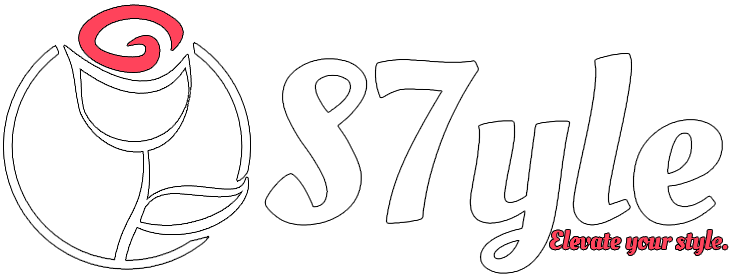We use our shoulders for nearly each little factor we do: reaching for a can behind the cupboard; placing a ebook on a excessive shelf; slipping our arm right into a sleeve; brushing our tooth. So when you could have a bum shoulder, it’s, properly, a giant bummer.
Most individuals with shoulder ache have some type of rotator cuff tear or harm. Issues with the rotator cuff—one of the essential components of the shoulder—are tremendous widespread (extra on why later). Yearly, greater than 2 million People see their physician complaining of rotator cuff ache, in response to the Cleveland Clinic.
Whereas stopping a rotator cuff harm isn’t all the time doable, displaying your shoulder some love within the type of each day rotator cuff stretches can definitely decrease your possibilities. Learn on to be taught extra concerning the rotator cuff, together with why it’s susceptible to ache, one of the best stretches to maintain it lengthy and limber, and what to do if you find yourself with an harm.
What’s the rotator cuff, precisely?
“The rotator cuff is a gaggle of comparatively small muscle tissue [and tendons] that connect to the entrance and the again of the shoulder,” says Anna Hammond, DPT, OCS, PCES, a bodily therapist at Core Train Options.
“The shoulder joint is a ball and socket joint,” so the rotator cuff muscle tissue “work collectively to assist maintain the ball centered within the socket,” Hammond says. In different phrases, it holds your shoulder in place and stabilizes the joint, so you are able to do issues like raise your arms or attain overhead.
Why is the rotator cuff susceptible to harm?
“The quick reply is most individuals have tight or weak rotator cuff muscle tissue,” says Grayson Wickham, DPT, CSCS, founding father of the Motion Vault.
Usually, tight rotator cuff muscle tissue on the entrance of the shoulder (together with the pectoralis minor) will pull the shoulders ahead (i.e., out of correct alignment), he says. The rotator cuff muscle tissue on the again of the shoulder will also be weak or unstable.
This lack of stability normally has to do with repeated poor posture (assume: slumping in entrance of a laptop computer 9 hours a day), Wickham says. Not actively stretching or strengthening the muscle tissue additionally performs an element.
Downside is, poor shoulder mobility and stability units off a dangerous domino impact, one thing Wickham calls the “joint ache and harm cycle.” The cycle is:
- Tight or unstable shoulder muscle tissue trigger compensations in your rotator cuff
- These compensations result in joint wear-and-tear (on this case, micro-tearing of particular rotator cuff muscle tissue comparable to your supraspinatus)
- This joint wear-and-tear ultimately results in ache and harm
Making issues worse, we rely on the rotator cuff for lots of on a regular basis actions (assume: combing our hair, pushing a vacuum) so it will get so much of wear-and-tear. Over time, this overuse damages and weakens the shoulder, making it much more inclined to harm, in response to Harvard Well being Publishing.
On prime of all this, the motion of the rotator cuff includes the sequencing of many muscle tissue together with the scapula (shoulder blade), the humerus (higher arm bone), and the rib cage, Hammond says. “If one element is not working properly, the rotator cuff can simply get pinched within the joint area or set as much as overwork,” she says.
Easy methods to know if in case you have a rotator cuff harm
Tears are one of the widespread rotator cuff accidents. They’ll occur unintentionally, say, in case you fall, or they could be a byproduct of wear-and-tear from repetitive actions and common getting older.
Signs of a rotator cuff tear embody, per the Cleveland Clinic:
- Issue elevating or shifting your arm with out ache or discomfort
- Normal weak spot in your shoulder joint
- Much less vary of movement in your shoulder
Tendonitis (or irritation of tendons within the shoulder) is one other widespread rotator cuff drawback. When it’s extreme, tendonitis may even trigger a rotator cuff tear.
Signs of rotator cuff tendonitis embody, per Harvard Well being Publishing:
- A uninteresting ache across the outdoors tip of the shoulder that will get worse while you push, pull, attain overhead, or raise your arm as much as the facet
- Ache while you lie on the affected shoulder
Can rotator cuff stretches stop an harm?
The quick reply: sure, partly. “The best solution to stop rotator cuff accidents is to enhance your general shoulder mobility and stability,” Wickham says. This implies ensuring the muscle tissue on the back and front of your shoulder are sturdy and versatile.
“The best solution to stop rotator cuff accidents is to enhance your general shoulder mobility and stability.”—Grayson Wickham, DPT
Focused stretching is a part of this equation. “An efficient shoulder mobility program will embody particular rotator cuff lively stretches,” Wickham says. The important thing phrase being lively. “Static stretching won’t enhance your rotator cuff vary of movement or stability,” he says.
The opposite pivotal piece for stopping a rotator cuff harm is strengthening the shoulder muscle tissue. Muscle activation workouts will assist improve rotator cuff mobility and stability. particularly with overhead actions, Wickham says.
Hammond agrees: “it is a few well-balanced weight coaching program that helps be sure your scapula strikes properly in all planes of movement and with management.”
“Usually, give attention to rib cage mobility and eccentric lengthening workouts of the serratus, pecs, lats, and subscap,” Hammond says. “The eccentric focus of an train helps provide you with size and power” in these muscle tissue, she says. Each are needed for staying harm free.
Different advantages of rotator cuff stretches
“Along with harm prevention, performing rotator cuff lively stretches and muscle activations will even enhance your efficiency in your each day life actions,” Wickham says.
A couple of on a regular basis issues you are able to do with extra ease (and fewer ache) when your rotator cuff is in tip-top form:
- Attain excessive in your cabinet to get one thing
- Open a door
- Raise your groceries
- Brush your hair
Including rotator cuff stretches to your common routine may degree up your health within the gymnasium or in your sport, Wickham says. You’ll be higher at push-ups, bench press, pull-ups, throwing a baseball or soccer, or swinging a tennis racket, simply to call just a few.
Finest rotator cuff stretches to stop harm
These shoulder workouts, which you are able to do at residence, are really helpful by Wickham to construct vary of movement and adaptability, and enhance stability and mobility throughout the shoulder joint to assist stop harm in your rotator cuff. For one of the best outcomes, incorporate them right into a well-balanced strength-training routine.
1. Rotator Cuff Muscle and Fascia Energetic Launch Mendacity With Ball
This targets and unlocks your posterior rotator cuff muscle tissue (those within the again) by lowering neurologic muscle tone, Wickham says. We like to make use of a Set off Level Therapeutic massage Ball for fascia stretches, however a lacrosse and even tennis ball will work simply as properly.
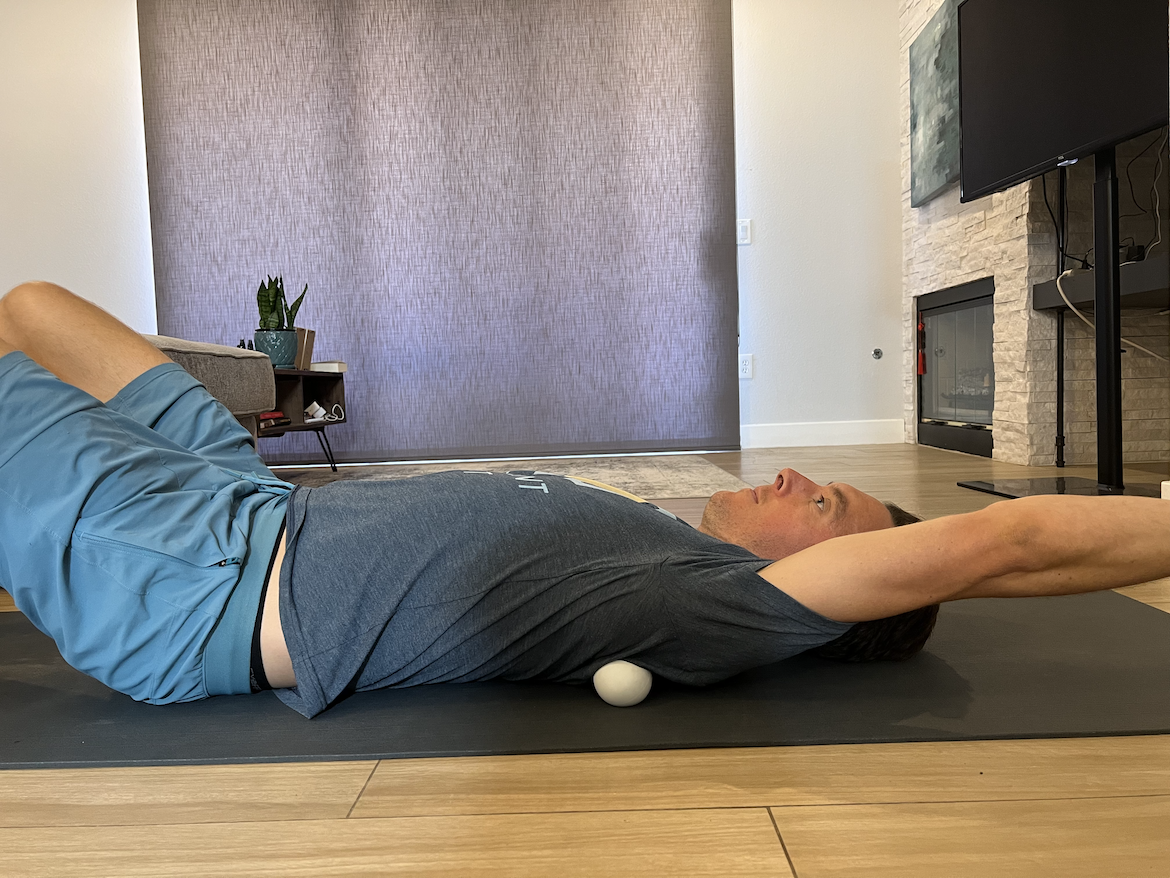
- Begin by mendacity in your again with one arm lifted straight overhead.
- Place the mobility ball in your rotator cuff muscle tissue of your overhead arm. To search out these muscle tissue, take your reverse hand and attain over your shoulder to seek out the backbone of your shoulder blade.
- Place the ball beneath this backbone. The ball must be on the underside half of your shoulder blade.
- Internally and externally rotate your shoulder. To do that, level your thumb upward towards the ceiling, after which rotate your shoulder, pointing your thumb downward so far as you may towards the bottom.
- You too can discover different areas in your rotator cuff by shifting the ball barely in both route.
- Proceed this shoulder rotation motion whereas mendacity on the ball for two minutes. Change and repeat in your different shoulder.
2. Sleeper Stretch Energetic Stretch
“This lively stretch and activation train targets the again of your shoulder,” Wickham says. “It maximally stretches and prompts your posterior rotator cuff muscle tissue and improves shoulder rotation.”
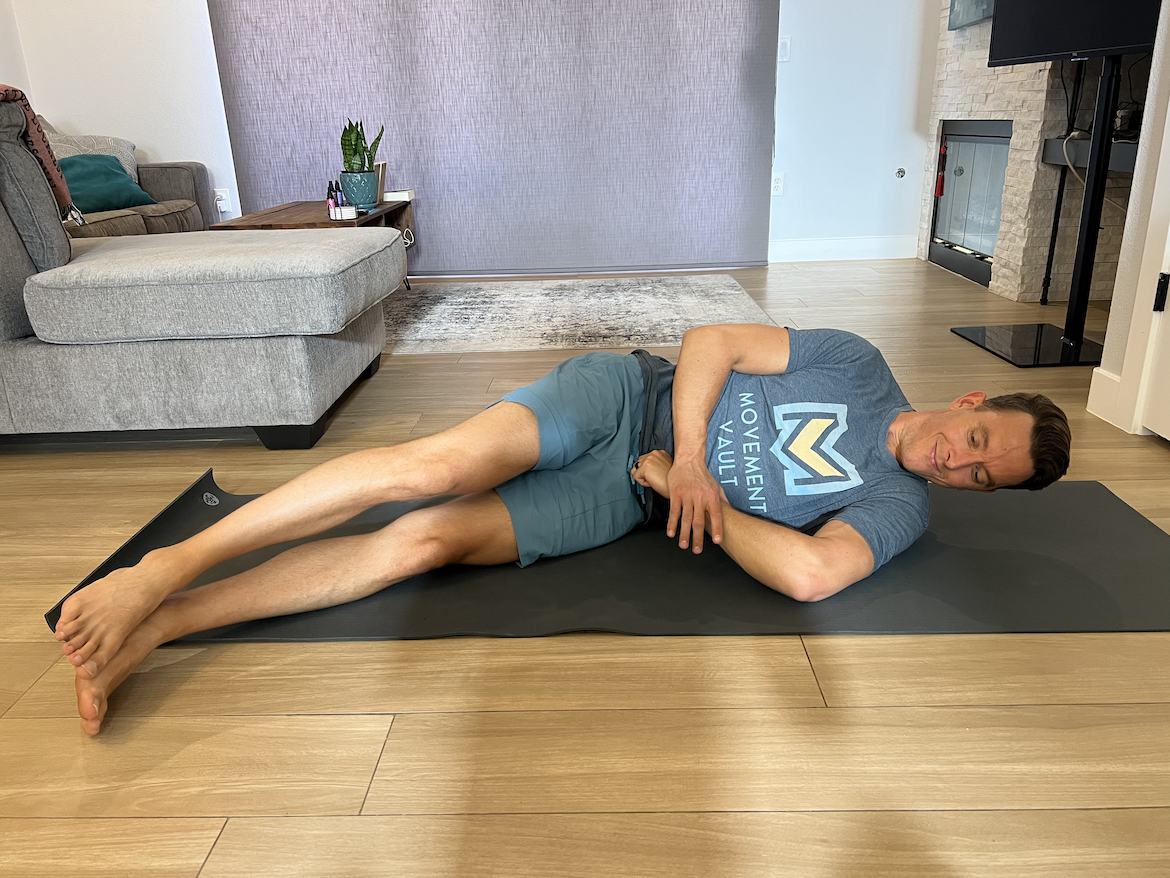
- Begin by mendacity on one facet with a slight bend at your hips.
- Your physique can be in a V place. Relaxation your head on prime of a pillow, foam curler, or yoga block.
- Level your backside forearm and hand instantly at your hip crease. It will present you the place your arm must be.
- Preserve the again of your shoulder and elbow of the underside arm on the bottom all the time.
- Take your reverse hand and place it on the highest of your different forearm and push down so far as doable.
- It’s best to now really feel a maximal stretch behind your shoulder that’s on the bottom.
- Whereas staying within the stretch, contract these muscle tissue by making an attempt to push your wrist into your reverse hand that’s holding your forearm down and offering resistance.
- Maintain this contraction for 20 seconds.
- Subsequent, chill out the muscle tissue, however keep within the stretch and contract the muscle tissue on the opposite facet of your shoulder by making an attempt to push your hand and forearm in the direction of the bottom even farther, so far as doable.
- Maintain this contraction for 10 seconds.
- That’s 1 rep; full 3 reps. It’s best to be capable of get somewhat deeper into the stretch with each repetition. Then change arms.
3. Reverse Snow Angels Standing
This can be a nice transfer much like shoulder flossing to enhance full lively vary of movement and stability of your shoulders in quite a few positions, as a result of it targets all the muscle tissue round your shoulder blade and shoulders.
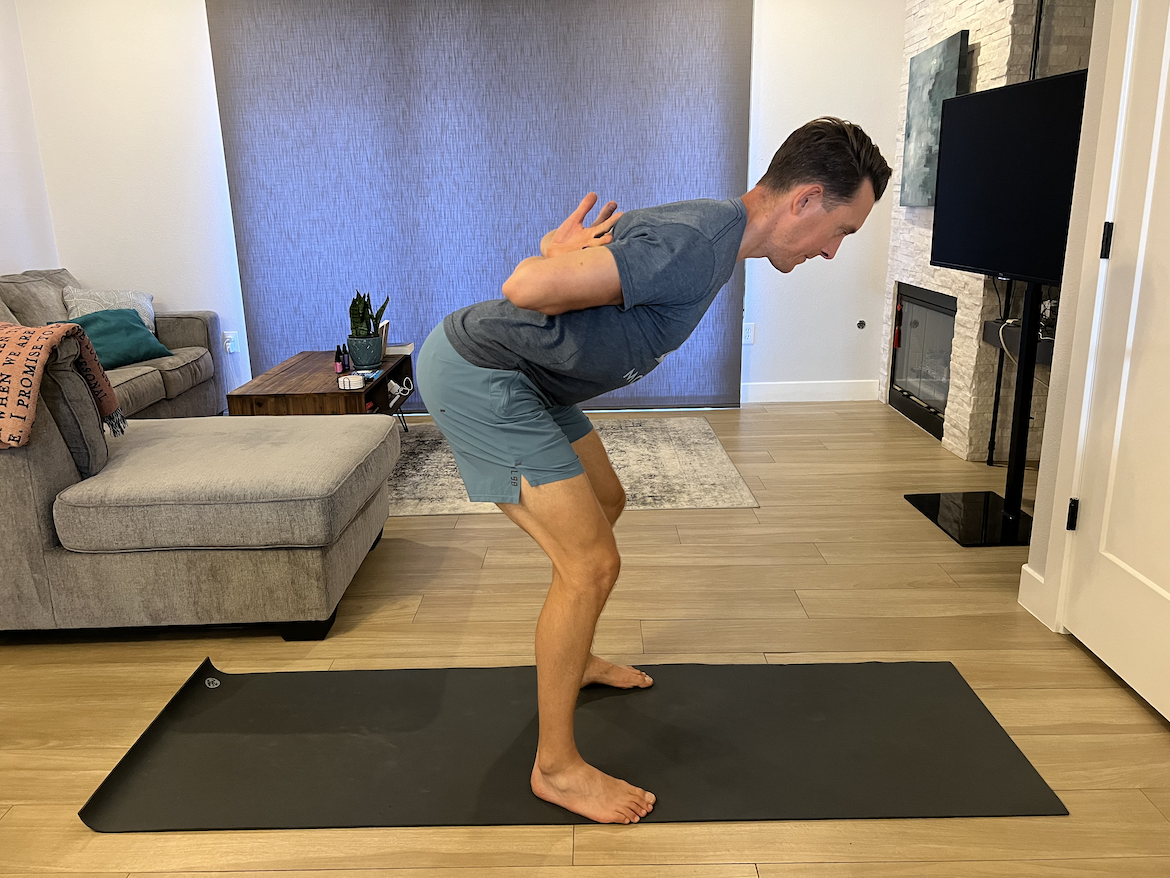
- Stand along with your ft shoulder-width aside.
- Push your hips again so far as doable till your chest is parallel to the bottom otherwise you really feel a stretch behind your hamstring muscle tissue.
- Preserve your again flat all the time. Along with your palms by your facet, and palms dealing with up, lengthen your shoulders upward as excessive as doable.
- Bend your elbows and produce your palms behind your again, making an attempt to the touch the bottoms of your reverse shoulder blades.
- Straighten your elbows, flip your palms down, and unfold aside your shoulder blades whereas bringing your arms out to the facet after which overhead so far as doable.
- As soon as your arms are maximally stretched out overhead, reverse the above steps, by pinching your shoulder blades collectively as you progress your arms out to the facet after which again all the way down to your facet.
- Flip your palms upward and lengthen your shoulders as excessive as doable upward.
- That’s 1 rep; carry out 3 units of three reps.
“The purpose of this train is to maneuver your shoulders and shoulder blades by means of their most pain-free vary of movement,” Wickham says. So if in case you have ache at any level, modify the stretch till the vary of movement is extra comfy for you.
4. Shoulder Flexion Energetic Stretch
By specializing in the entrance and facet of your shoulder, particularly your lat and rotator cuff muscle tissue, this transfer improves overhead mobility and stability, in response to Wickham. It is also a good way to stretch out shoulder knots.
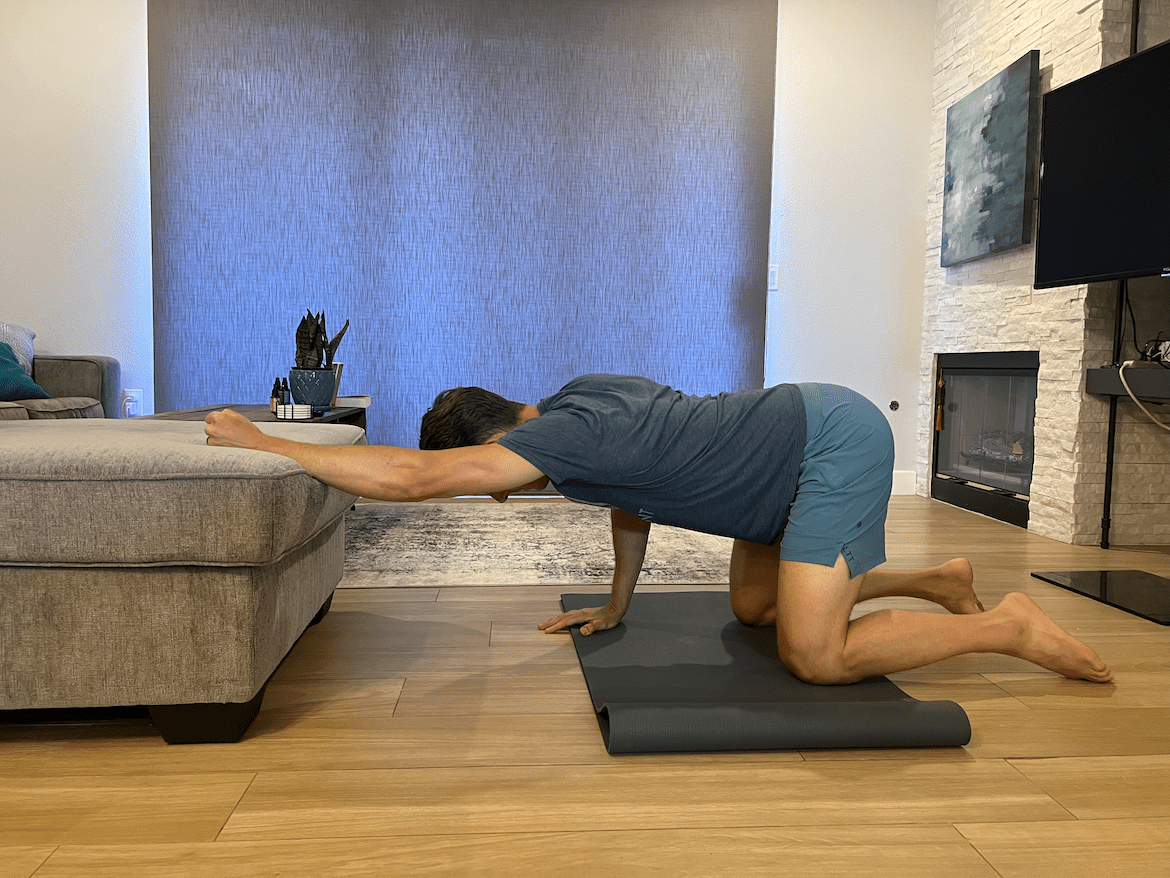
- Begin in your palms and knees. Place one hand along with your thumb dealing with upward onto a field, bench, or piece of furnishings.
- Protecting your elbow straight all the time, push your chest all the way down to the bottom so far as doable till you’re feeling a maximal stretch within the entrance and facet of your shoulder.
- Whereas staying on this stretch, contract the shoulder muscle tissue by driving your hand and arm into the field and holding this contraction for 20 seconds.
- Subsequent, chill out the muscle tissue, however stay within the stretch. Contract the muscle tissue on the opposite facet of your shoulder by making an attempt to raise your hand up off of the field as excessive as doable. You most likely received’t be capable of raise your arm as a result of it’s maximally stretched (which is completely regular), however the thought is to inform your muscle tissue to attempt. Maintain this contraction for 10 seconds.
- This equals 1 rep; do 3 reps, then change arms.
5. Cross-Chest Posterior Shoulder Eccentrics
This lively stretch and activation train targets the again of your shoulder to enhance posterior rotator cuff mobility and stability, Wickham says.
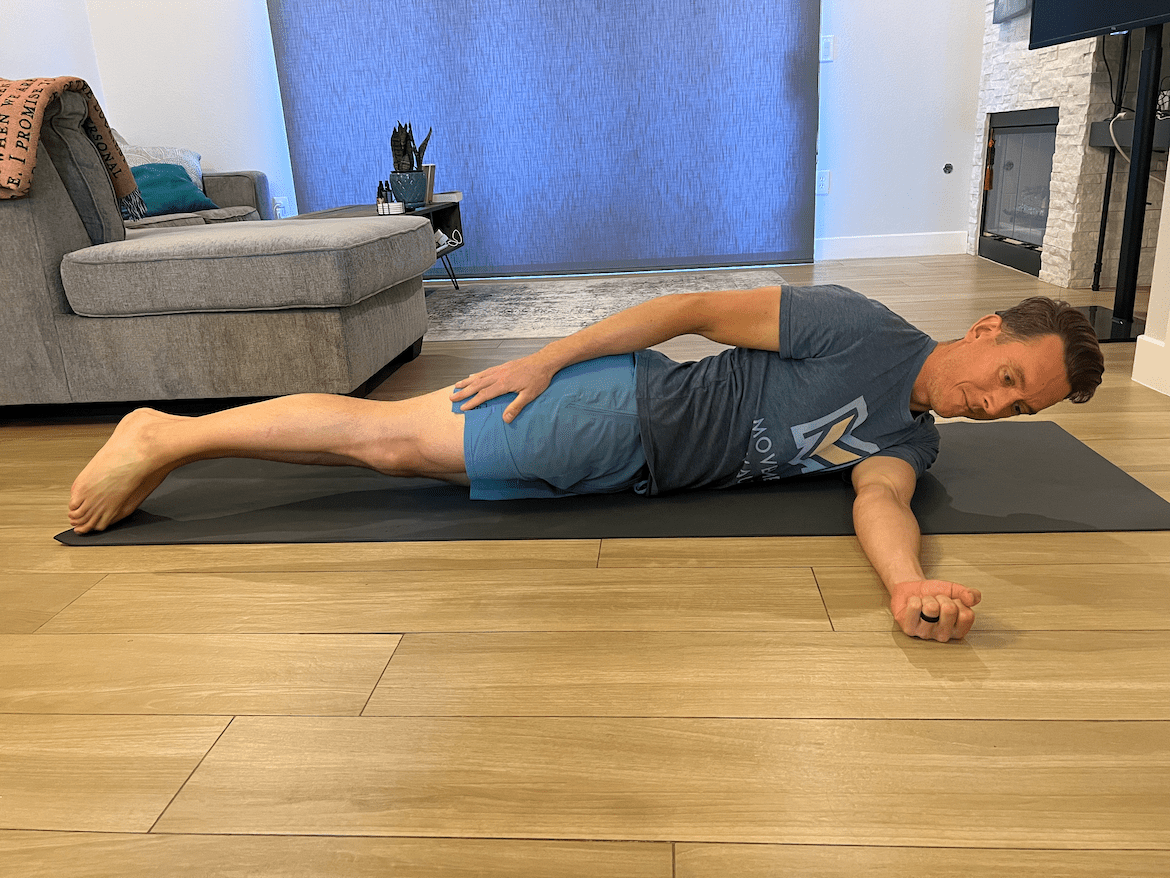
- Begin by mendacity in your facet with one arm instantly out in entrance of you, palm dealing with up.
- Contract the muscle tissue on the again of your shoulder in your straight arm by pushing the again of your hand and arm down into the bottom.
- Whereas holding this contraction, slowly decrease your reverse shoulder and chest all the way down to the bottom so far as doable. This could take you about 5 seconds.
- Be certain to proceed to press your arm down into the bottom, contracting this muscle all the time. It’s best to really feel it behind your shoulder.
- Subsequent, transfer your arm upward about 6 inches and repeat the steps above.
- This equals 1 rep. Full 10 reps and repeat on the opposite facet.
6. Pectoralis Energetic Stretch
In case you’ve ever accomplished a chest stretch by means of an open doorway, this transfer may be very related. It provides some contractions to the muscle tissue on the entrance of your shoulder, particularly your pectoralis muscle tissue, to not simply stretch your entrance shoulder however enhance its stability, too.
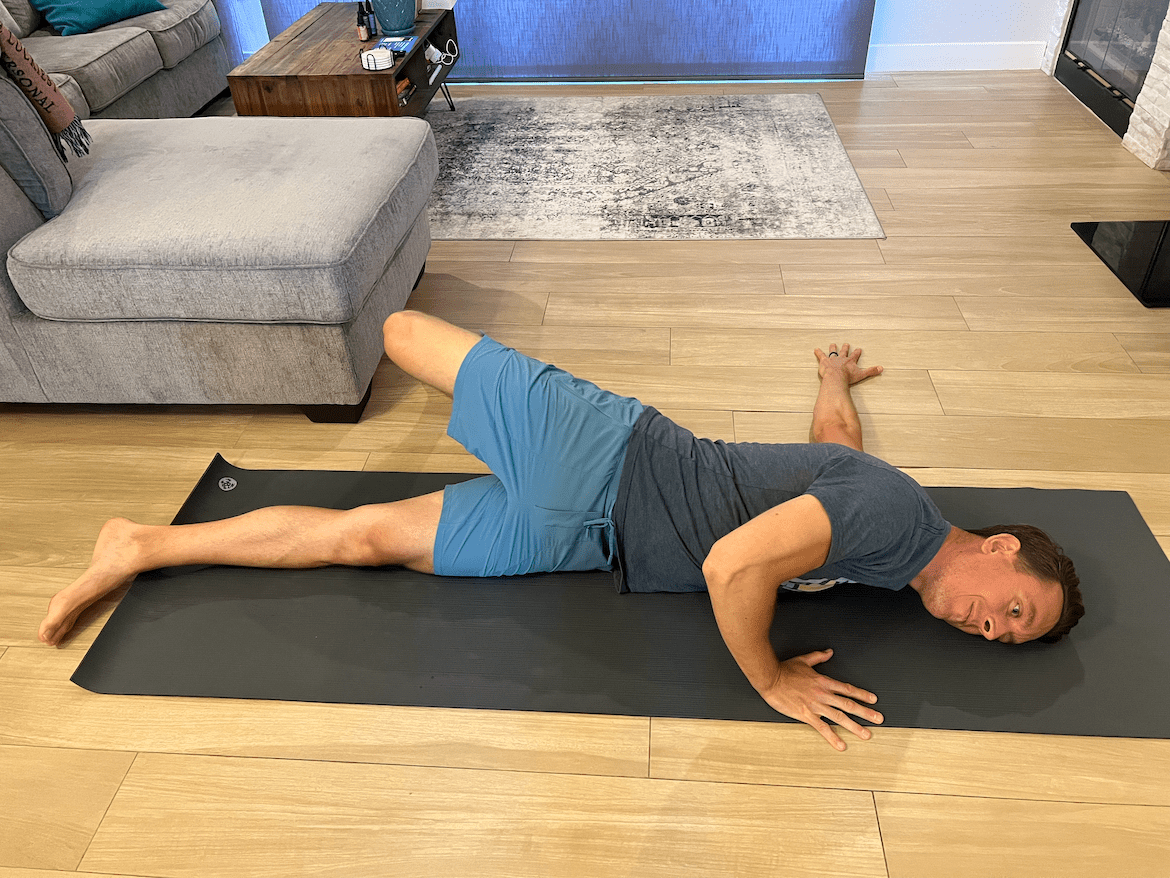
- Begin by mendacity in your abdomen with one arm straight out to your facet at a 90-degree angle out of your physique and palm down.
- Utilizing your reverse arm for assist, raise and rotate your reverse hip and leg off of the bottom, so far as doable backward. It will improve the stretch within the entrance of the shoulder of your straight arm.
- Whereas staying within the stretch, contract the shoulder muscle tissue by driving your hand and arm into the bottom. Maintain this contraction for 20 seconds.
- Subsequent, chill out the muscle tissue, however keep on this stretch. Contract the muscle tissue on the again of your shoulder by making an attempt to raise your hand and arm up off of the bottom as excessive as doable. Maintain this contraction for 10 seconds.
- If you’re deep into the stretch, you will be unable to raise your arm a lot (it is a good factor). Proceed to contract the muscle tissue on the again of your shoulder.
- Briefly come out of the stretch and bend your elbows 3 instances. Then place your arm again on the bottom, however transfer it about 6 inches upward. Repeat the identical steps above.
- Proceed this motion sample, shifting your arm upward every time till it’s nearly instantly overhead. The upper you progress your arm upward, the much less it is possible for you to to rotate your physique.
- Repeat on the other facet.
Workouts to keep away from with an injured rotator cuff
Whereas relaxation is vital for restoration, you shouldn’t cease shifting your shoulder altogether. This will trigger “frozen shoulder,” a situation that happens when shoulder tissues shrink and cut back its vary of movement, in response to Harvard Well being Publishing. Staying lively will assist stop this drawback and maintain your shoulder limber.
That stated, you’ll additionally should be cautious about which workouts you select to do—you don’t wish to worsen your harm (or your ache). Sure workouts, like overhead actions (or something that includes elevating your arms) and horizontal pushing actions, can worsen a rotator cuff harm, Wickham and Hammond say.
Some workouts to keep away from with a rotator cuff harm:
Different (maybe shocking) workouts that add pressure to a nasty shoulder embody, per the Cleveland Clinic:
- Deadlifts (they will pull your arm out of your socket and place a ton of pressure on the rotator cuff)
- Shrugs (they pull down in your shoulder)
- Squatting with a barbell (resting the bar throughout your shoulders can stress the rotator cuff)
Nonetheless, everybody (and each harm) is completely different. “The particular stretches and workouts to keep away from rely in your extent of harm and your present shoulder mobility and stability degree,” Wickham says. “Let the discomfort down your arm be your information,” Hammond says. Merely put: if one thing hurts, cease doing it.
Merely put: if one thing hurts, cease doing it.
Alternatively, you can even accommodate your shoulder by modifying (on this case, decreasing) the vary of movement of an train or stretch, Wickham provides. As you get well, you’ll step by step rebuild vary of movement and power.
FAQ
What if I have already got a rotator cuff harm?
Generally even while you maintain your shoulders (learn: stretch and strengthen them usually), accidents nonetheless occur (argh). Now what?
Whereas it would take a while, most accidents can heal with somewhat assist. It normally takes two to 4 weeks to get well from rotator cuff tendonitis or a small tear, in response to Harvard Well being Publishing. For extra severe tears, the therapeutic course of might final a number of months.
Both method, with endurance and a few TLC, you may efficiently get well from a rotator cuff harm (and relieve rotator cuff ache). Right here’s how, per the Cleveland Clinic:
- Relaxation (and possibly an arm sling) to offer your overused shoulder much-needed downtime.
- Nonsteroidal anti-inflammatory medication (NSAIDs) to restrict ache and swelling.
- Steroid injections to ease ache and swelling.
- Bodily remedy for rebuilding vary of movement and power.
Can a rotator cuff heal by itself?
Fortunately, many rotator cuff accidents—together with tendonitis and tears—can heal with bodily remedy (and with out surgical procedure), in response to Harvard Well being Publishing.
Living proof: 8 of 10 folks with partial rotator cuff tears make a full restoration utilizing conservative remedies (assume: ice, NSAIDs, bodily remedy), per the Cleveland Clinic.
Nonetheless, “not all rotator cuff accidents are created equal,” Hammond says. “You’ll be able to have completely different thicknesses or variety of muscle tissue concerned.”
In different phrases, whether or not you will get higher by yourself is determined by “the extent of harm, a.okay.a., muscle tearing,” Wickham provides. Much less severe rotator cuff tears (like grade one or two tears, for instance) may be efficiently rehabbed with the assist of a bodily therapist, he says.
“An efficient rotator cuff tear rehab program won’t solely make it easier to lower your shoulder ache, however will even repair the foundation reason behind your rotator cuff tear, which typically is poor shoulder mobility and stability,” Wickham says.
“It’ll additionally give attention to different areas of your physique as properly comparable to higher again mobility, core stability and even hip mobility,” he says. “Poor mobility in these areas will trigger further compensation in your shoulders, which can usually result in wear-and-tear and ultimately shoulder ache and harm.”
Then again, extra extreme accidents, like grade three tears, will usually require surgical procedure, Wickham says.
What’s the finest place to alleviate rotator cuff ache?
An injured rotator cuff may be fairly painful. You would possibly discover it tough to get comfy in any place.
“Usually, mendacity in your injured shoulder is the worst place,” Wickham says. Right here’s what to do as an alternative to alleviate ache when mendacity in your facet:
- Depart your arm by your facet whereas sitting (or standing). Elevating your arm overhead can worsen the discomfort.
- When mendacity down, lie in your reverse (i.e., wholesome) shoulder. In case you nonetheless have ache on this place, put a giant pillow below the highest/affected arm to assist assist it/stop it from getting pulled throughout your physique.
“Mendacity in your again is commonly painful too,” Hammond says. To assist:
- Put a pillow below your affected arm along with your hand in your abdomen.
- Place a small towel behind the again of shoulder (the concept isn’t to shove the shoulder ahead however moderately to carry the mattress or floor as much as it to assist it chill out and really feel supported).
If sitting is painful, do that, Hammond says:
- Fold a pillow in half to place below your arm earlier than you sit down.
Our editors independently choose these merchandise. Making a purchase order by means of our hyperlinks might earn Properly+Good a fee.
